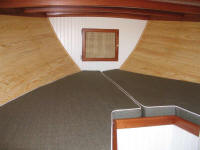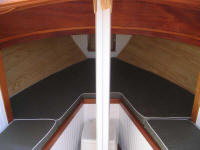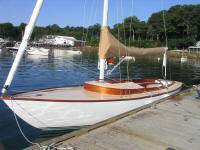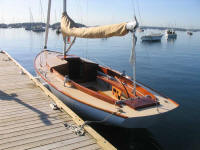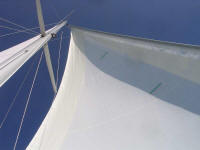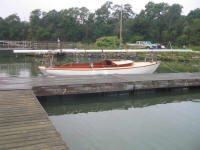
|
|
~MENU~ |
| Home |
| The Concept |
| The Boat |
| Bringing Her Home |
|
Weekly Progress Log |
|
Daysailor Projects |
| The Boat Barn |
| Resources |
| Other Sites |
| Email Tim |
|
|
| Progress Report: 2005 Archives |
|
January February March April May June July August September October November December |
|
Reports from September 2005 9/4/05 9/11/05 9/18/05 9/25/05 |
|
Log for the Week Ending September 4, 2005 Just because the boat made it to the water didn't mean that the work was complete--far from it, actually. The work list remaining to be done was relatively long, though mostly centered around various bits of interior trim that I hadn't done previously. I didn't expect to get much of this work done with the boat in the water. |
|
Other remaining work was far more important: finishing everything required in order to sail the boat! At the time of launching, the work remaining before the boat could be sailed was as follows:
Also incomplete and awaiting delivery were the new mainsail cover and the interior cushions. (arrived on Friday) |
|
Monday morning, I spoke with the sail loft first thing to let them know that indeed the boat was in the water and rigged, as planned, and that they could go right ahead and install the furler so that they could then start building the headsail. I had the sail loft install the furler because they gave me a fair price, and because it involved more work than I cared to undertake at this late stage, particularly since up-the-mast work was required (which to date I do not do). Had the furler been able to be installed with the rig on the ground, as originally hoped, I would have installed it myself. Towards the end of the day, I headed down to check out the new gear and to determine what hardware I needed in order to run the furling line aft. The new furler was much cooler than I expected; in fact, it was completely invisible! How neat that one could have a furler, and never even know it was there! I was very excited at the new invisible furler, which I hadn't known was available, till I got on board and realized to my dismay that, alas, it was not an invisible furler after all...it was simply a bare headstay. They hadn't put it on after all. I was unhappy at this turn of events, but a phone call to the loft reassured me (sort of) that the furler would be installed the next day, Tuesday. While I felt that every single day was extremely important, what with the very limited time I had with the boat in the water, there was little I could do but cheerfully accept the setback. |
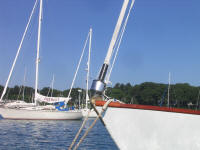 In
any event, the furler was successfully installed the next day, to my great
pleasure. In
any event, the furler was successfully installed the next day, to my great
pleasure.I didn't do that much for the first part of the week, as I was waiting for all the pieces to finally fall into place. Happily, my new traveler arrived on Wednesday, filling that large void in my inventory. Friday morning, I headed out to the boat early to try and get the traveler installed, since I anticipated a full workday finalizing all the hardware installations so that the boat could go sailing. Some bolts that I had ordered for the traveler had been unexpectedly backordered, and a quick run to a local store had not produced replacements. Still, I headed out to see what I could do. |
 On
the boat, I soon discovered that I would be unable to through bolt the traveler
as planned: the location at the aft end of the cockpit did not allow
passage of through bolts through the deck beam, because of the way I had
installed the aftermost plywood portion of the cockpit well. This meant
that I'd have to secure the traveler with long screws into the beam, which was
OK, but I had no such screws. I headed ashore to purchase these screws,
and at the same time received word that my headsail, cushions, and mainsail
cover were complete and ready for pickup, so I swung over for that as well. On
the boat, I soon discovered that I would be unable to through bolt the traveler
as planned: the location at the aft end of the cockpit did not allow
passage of through bolts through the deck beam, because of the way I had
installed the aftermost plywood portion of the cockpit well. This meant
that I'd have to secure the traveler with long screws into the beam, which was
OK, but I had no such screws. I headed ashore to purchase these screws,
and at the same time received word that my headsail, cushions, and mainsail
cover were complete and ready for pickup, so I swung over for that as well.
|
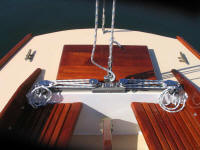 Back
out at the boat, I temporarily raised the new headsail to determine the sheet
lead location, a necessary measurement so that I could install the genoa tracks.
I didn't yet have a line for the furling drum--the sailmaker was getting me
one--so I couldn't permanently install the sail just yet. After a brief
fly, during which I determined a general location for the lead, I lowered the
sail to the deck again--but not before I noticed that it was actually a crosscut
sail, when I had carefully and specifically ordered a tri-radial. The sail
looked nice, but it wasn't what I had expected, nor what I had ordered. Back
out at the boat, I temporarily raised the new headsail to determine the sheet
lead location, a necessary measurement so that I could install the genoa tracks.
I didn't yet have a line for the furling drum--the sailmaker was getting me
one--so I couldn't permanently install the sail just yet. After a brief
fly, during which I determined a general location for the lead, I lowered the
sail to the deck again--but not before I noticed that it was actually a crosscut
sail, when I had carefully and specifically ordered a tri-radial. The sail
looked nice, but it wasn't what I had expected, nor what I had ordered.
|
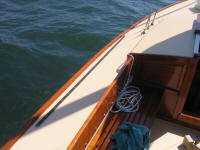 I
installed two lengths of 6' genoa tracks with 1-1/2" machine screws, which I
drilled and tapped into the deck. From beneath, I applied fender washers
and nuts, and sealed the tracks with plenty of polysulfide. At the
transom, I installed the new traveler with 3" stainless steel screws, which bit
deeply into the wood of the deck beam beneath. I
installed two lengths of 6' genoa tracks with 1-1/2" machine screws, which I
drilled and tapped into the deck. From beneath, I applied fender washers
and nuts, and sealed the tracks with plenty of polysulfide. At the
transom, I installed the new traveler with 3" stainless steel screws, which bit
deeply into the wood of the deck beam beneath. |
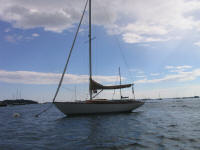 These
installations, and later installing the furling line and hoisting the headsail,
took up most of the day, and I was beat after a full day in the hot sun.
Since we planned go cruising over the labor day weekend, by 1500 I was done on
board, even though a few small jobs remained before I could truly sail the boat:
I needed to install some fairleads and a cleat for the furling line, and needed
to complete the installation of a few nuts and washers on the genoa tracks.
But it was time to go for the day, knowing that I'd have a quick day of it the
next time I came, and could easily finish up the minor jobs and then GO SAILING! These
installations, and later installing the furling line and hoisting the headsail,
took up most of the day, and I was beat after a full day in the hot sun.
Since we planned go cruising over the labor day weekend, by 1500 I was done on
board, even though a few small jobs remained before I could truly sail the boat:
I needed to install some fairleads and a cleat for the furling line, and needed
to complete the installation of a few nuts and washers on the genoa tracks.
But it was time to go for the day, knowing that I'd have a quick day of it the
next time I came, and could easily finish up the minor jobs and then GO SAILING! |
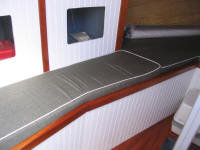 By
the way, the new interior cushions looked outstanding, and really pulled the
interior together. By
the way, the new interior cushions looked outstanding, and really pulled the
interior together. |
|
Log for the Week Ending September 11, 2005
|
|
Back at the mooring, I installed three bullseye fairleads on the roller furling line to lead it properly aft to the cockpit. I held the line near the toerail on the port side. I also added a small cleat for the furling line. Then, I installed fender washers and nuts on the bolts securing the genoa tracks; since the bolts were threaded into tapped holes, immediate installation of washers and nuts had not been necessary, but they were required before I could apply any loads to the tracks. |
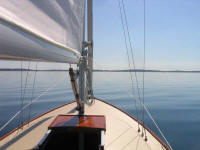 By
1000 I was done with the jobs. There was still no wind at all, so I tried
to reeve a reefing line for the mainsail through the boom; unfortunately, I did
a shoddy job of taping the messenger line to the new reefing line, and it came
apart halfway through the boom. With no immediate means on board of
reefing the line, I put this project aside for the time being, and raised the
mainsail instead. By
1000 I was done with the jobs. There was still no wind at all, so I tried
to reeve a reefing line for the mainsail through the boom; unfortunately, I did
a shoddy job of taping the messenger line to the new reefing line, and it came
apart halfway through the boom. With no immediate means on board of
reefing the line, I put this project aside for the time being, and raised the
mainsail instead. |
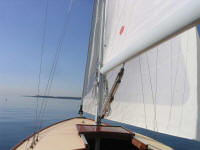 Starting
the engine, I motored out of the harbor, heading in the general direction of
Hussey Sound, an open section between the ringing islands through which the
seabreeze, when formed, tends to flow first. I figured my best chance of
wind might be found there. Along the way, I unrolled the genoa to check
things out with a bit of artificial apparent wind. I noticed that I had
wrapped the roller furling line the wrong way last week, and briefly thought
about dropping the sail then and there to fix the problem. However, this
seemed to be too much to deal with--the self-contained halyard is not the most
convenient thing in the world--so I decided to leave it for now, and deal with
it later back at the mooring. Starting
the engine, I motored out of the harbor, heading in the general direction of
Hussey Sound, an open section between the ringing islands through which the
seabreeze, when formed, tends to flow first. I figured my best chance of
wind might be found there. Along the way, I unrolled the genoa to check
things out with a bit of artificial apparent wind. I noticed that I had
wrapped the roller furling line the wrong way last week, and briefly thought
about dropping the sail then and there to fix the problem. However, this
seemed to be too much to deal with--the self-contained halyard is not the most
convenient thing in the world--so I decided to leave it for now, and deal with
it later back at the mooring. |
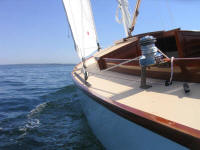 Out
by the Hussey, the wind did arise, and shortly I set the genoa again, and the
boat heeled slightly to the light breeze. I shut down the diesel.
What a feeling! I tacked her back and forth a few times and adjusted the
sheet leads a bit until the genoa seemed to set properly. The breeze was 6
or 7 knots. I had no means of determining speed on board, but the boat
felt good. Out
by the Hussey, the wind did arise, and shortly I set the genoa again, and the
boat heeled slightly to the light breeze. I shut down the diesel.
What a feeling! I tacked her back and forth a few times and adjusted the
sheet leads a bit until the genoa seemed to set properly. The breeze was 6
or 7 knots. I had no means of determining speed on board, but the boat
felt good. |
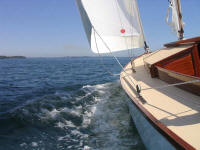 The
wind funneled through the sound and over the island, and increased to around 10
or 12 knots. I bore off onto a close reach and savored the feeling for a
while, enjoying how everything was going. My eyes darted from stay to
stay, turnbuckle to chainplate, mast partners to step, looking for any signs of
a problem or, God forbid, structural weakness. (I didn't really expect
this, but I try to expect the unexpected...) The
wind funneled through the sound and over the island, and increased to around 10
or 12 knots. I bore off onto a close reach and savored the feeling for a
while, enjoying how everything was going. My eyes darted from stay to
stay, turnbuckle to chainplate, mast partners to step, looking for any signs of
a problem or, God forbid, structural weakness. (I didn't really expect
this, but I try to expect the unexpected...) |
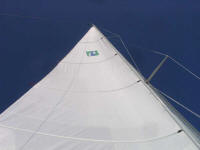 The
mainsail needed some additional sail control work. The outhaul, a one-part
line, was unadjustable, and I couldn't even get it tight enough for the light
breeze. I also needed a cunningham to adjust the draft forward, and the
boom vang control currently led to a cleat on the mast; some sort of other lead,
or a cam cleat at the lower end, would be required. Otherwise, the
triradial mainsail looked beautiful, and I was very pleased. The
mainsail needed some additional sail control work. The outhaul, a one-part
line, was unadjustable, and I couldn't even get it tight enough for the light
breeze. I also needed a cunningham to adjust the draft forward, and the
boom vang control currently led to a cleat on the mast; some sort of other lead,
or a cam cleat at the lower end, would be required. Otherwise, the
triradial mainsail looked beautiful, and I was very pleased. |
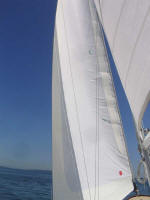 The
genoa also looked great, though I still harbored disappointment over the
improper sail that was delivered. The helm was neutral in the lighter
breezes, with light weather helm in the stronger breezes. I missed having
a tiller extension, but hadn't put one on just yet since not everyone likes
extensions. The sheet winches fell closely at hand to the helm, and the
self-tailers were a pleasure to use. The
genoa also looked great, though I still harbored disappointment over the
improper sail that was delivered. The helm was neutral in the lighter
breezes, with light weather helm in the stronger breezes. I missed having
a tiller extension, but hadn't put one on just yet since not everyone likes
extensions. The sheet winches fell closely at hand to the helm, and the
self-tailers were a pleasure to use.After an hour or two of thoroughly enjoyable sailing, I returned to the mooring, where I lowered the genoa and rewrapped the furling line the correct direction. I also tried to increase halyard tension, as it had been too loose earlier. With a holiday-shortened week full of other commitments, I didn't make it back out to the boat for the rest of the week. I looked forward to 2 or 3 more test sails in the next week, but time was running out, as I had scheduled the boat to be hauled on Sept. 15; we had some traveling plans and it would be imprudent to leave the boat in the water this late in the season while not being around to check on and use her. |
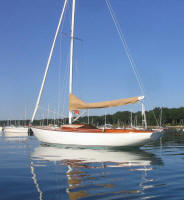 Faithful
reader, look for these weekly logs to slowly dwindle, depending on work
completed, over the next month or two. In the coming weeks, I'll only post
updates when there is work on which to report. Given some other projects
and plans in my schedule, there may be a few weeks with no updates. Faithful
reader, look for these weekly logs to slowly dwindle, depending on work
completed, over the next month or two. In the coming weeks, I'll only post
updates when there is work on which to report. Given some other projects
and plans in my schedule, there may be a few weeks with no updates.
|
The plans for the boat in the near future are as
follows:
Once these jobs are complete, the boat will be stored as required, and updates will cease. I expect 1-2 full weeks of punch list work, after which the boat should be more or less complete. |
|
Log for the Week Ending September 18, 2005
It was another pleasant sail in building winds. I had no real means of reefing the mainsail--an oversight, albeit one I was conscious of before we went out, so by the end of the 2-hour sail the boat was overpowered, though she handled it as expected. With others on board to handle the helming, I roved around, which I had been unable to do on my earlier sail, and checked out everything. I noticed that the genoa interfered slightly with the jumper stays, and took several photos so that the sail could be recut later. |
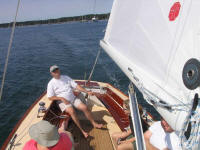 I
was otherwise occupied on Monday and Tuesday and could not get out. I had
planned on a final sail on Wednesday, but it was foggy in the morning, and hung
around all day long. Therefore, late Wednesday, instead of sailing, I
dismantled the boat, removing sails and boom, in preparation for Thursday's
haulout. Since I was going away later in the week, it was necessary (for
my peace of mind) to haul the boat and bring her home to the safety of the shop,
as fall brings with it the chance of nor'easters and the occasional tropical
storm remnant, and I could not leave the boat unattended. I
was otherwise occupied on Monday and Tuesday and could not get out. I had
planned on a final sail on Wednesday, but it was foggy in the morning, and hung
around all day long. Therefore, late Wednesday, instead of sailing, I
dismantled the boat, removing sails and boom, in preparation for Thursday's
haulout. Since I was going away later in the week, it was necessary (for
my peace of mind) to haul the boat and bring her home to the safety of the shop,
as fall brings with it the chance of nor'easters and the occasional tropical
storm remnant, and I could not leave the boat unattended. |
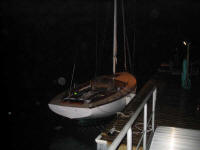 Thursday
morning, I had a 1000 haulout scheduled, with the mast to come out sometime
before. In order to meet this schedule, I arrived at the dock at just
before 0530, and rowed out in the dark to the boat. Fortunately,
yesterday's fog had cleared, so it was a pleasant morning. Motoring the
boat the 9 miles up the nearby Royal River to the boatyard and haulout in the
fog would have been possible, but certainly less than convenient. Thursday
morning, I had a 1000 haulout scheduled, with the mast to come out sometime
before. In order to meet this schedule, I arrived at the dock at just
before 0530, and rowed out in the dark to the boat. Fortunately,
yesterday's fog had cleared, so it was a pleasant morning. Motoring the
boat the 9 miles up the nearby Royal River to the boatyard and haulout in the
fog would have been possible, but certainly less than convenient. |
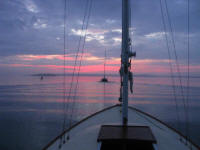 I
brought the boat to the dock to drop off the dinghy and to load on the two
sawhorses needed to support the mast on deck, and then departed just before 0600
for the 1.5 hour trip around and up the river, arriving at the boatyard at 0730.
By about 0800, the mast was out, and I motored the short distance to the town
landing to await haulout at 10. I
brought the boat to the dock to drop off the dinghy and to load on the two
sawhorses needed to support the mast on deck, and then departed just before 0600
for the 1.5 hour trip around and up the river, arriving at the boatyard at 0730.
By about 0800, the mast was out, and I motored the short distance to the town
landing to await haulout at 10. |
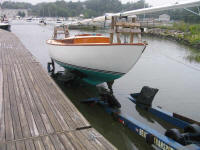 By
1030, the boat was back in the shop, safe and sound after her whirlwind sea
trial. The time in the water was far too short, partly since some slacker
couldn't get the boat finished early enough in the summer and partly because of
our fall traveling schedule, but the sea trial allowed me to complete some sail
and hardware installations, test systems, and generally get a good feel for the
boat. While minor projects remained, I deemed the sea trial a complete
success; the only projects remaining had been known before launching anyway, and
were unrelated to sailing performance. By
1030, the boat was back in the shop, safe and sound after her whirlwind sea
trial. The time in the water was far too short, partly since some slacker
couldn't get the boat finished early enough in the summer and partly because of
our fall traveling schedule, but the sea trial allowed me to complete some sail
and hardware installations, test systems, and generally get a good feel for the
boat. While minor projects remained, I deemed the sea trial a complete
success; the only projects remaining had been known before launching anyway, and
were unrelated to sailing performance. |
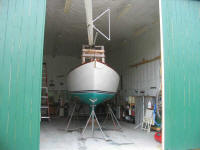 With
the boat safe and sound back inside my shop, I prepared for the final punch list
of small items, and also began to figure out exactly how I planned to market the
boat. With
the boat safe and sound back inside my shop, I prepared for the final punch list
of small items, and also began to figure out exactly how I planned to market the
boat. |
